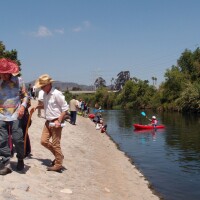Urban River Parkways are a Cost-Effective Cure for the Public Ill

The Los Angeles River is far from being the green oasis many advocates would like to see, but it is making some good headway. In the last three months alone, we've seen the opening of the North Valleyheart Riverwalk, the L.A. River headwaters, and an expanded Marsh Park. These are all causes for celebration for the communities they serve, but for readers not in proximity to those places, they may induce reactions such as "Oh, another park. What's new?"
Any jaded reaction could do well to read a recent report released by the Center for Occupational and Environmental Health in UCLA. The report, released by Dr. Richard J. Jackson, who chairs the Environmental Health Sciences department at UCLA and formerly served as California's State Health Officer and worked at the federal Centers for Disease Control and Prevention (CDC), reveals the many health benefits associated with a specific land use: urban river parkways -- such as what Los Angeles is trying to realize by the 51-mile Los Angeles River.
The report, the first of its kind, firmly links myriad health benefits to urban river parkways. "There is no medicine or treatment that works as well to reduce the negative effects of obesity and related illnesses as physical activity, such as walking, running, and bicycling," said Dr. Jackson in a statement. "River parkways can benefit physical, mental, community, and environmental health, as well as the overall economic well-being of the population at large."
It isn't just rhetoric from politicians at park opening ceremonies; Dr. Jackson's report is backed by actual research. At more than 60 pages, the report is quite dense and piles on research after research that shows river parkways can benefit individuals physically and mentally. It's found that urban river parkways could lead to a decreased risk of disease, increased life span, better moods, mental health and physical strength, less stress, and fewer work and school days missed, among others. It could also counter obesity, risk of diabetes and stroke, depression, and anxiety.
Not only does it benefit individuals, but societies as well. It can build stronger community ties, increase environmental sustainability, and even add to a neighborhood's economical well-being. The report calls out a park in Greenville, South Carolina. The park, built in 2004, cost $13 million but has brought over $100 million investments to the surrounding area. In Camden, New Jersey the 1.4-mile greenway Ulysses S. Wiggins Park has brought 600 residents, 2,000 workers, and 2 million tourists since it's been constructed. Another study also found that property values in Pennypack Park in Philadelphia increased more than tenfold, from $1,000 per acre at 2,500 feet from the park to $11,500 per acre at 40 feet from the park.
More importantly, all these benefits outweigh the costs of building urban river parkways. The report highlights the finding that "every $1 investment in trails for physical activity leads to $2.94 in direct medical benefit." Another study cited notes that the cost per mile of bicycle and pedestrian trails is only between $83 and $592, whereas the annual cost per capita of physical inactivity is about $622.
The results of the study are no surprise to readers, especially those who are often surrounded by nature. Many of the effects discussed can be personally experienced by just taking a walk through your local park, but it is the first time that a public health has been linked to urban use so decisively. "The problem is that we look at things in separate boxes," said Dr. Jackson during an interview on Sacramento's Capital Public Radio. "The health benefits don't accrue to parks, and parks don't get credit for the health benefits they're doing." Dr. Jackson advocates for a more holistic approach.
Though the report doesn't delve into the funding resources to build such parkways, it does note with some hint of warning that proposition 84 grants that have funded the construction of riverside projects have already been depleted and new funding sources need to be identified.
The question of new construction in urban river parkways may still be unanswered, but it doesn't stop communities and neighborhoods in taking advantage of a healthy, environmentally-sustainable land use that are their riverside parks. Go ahead, choose one spot in our L.A. River Field Guide to explore today.





